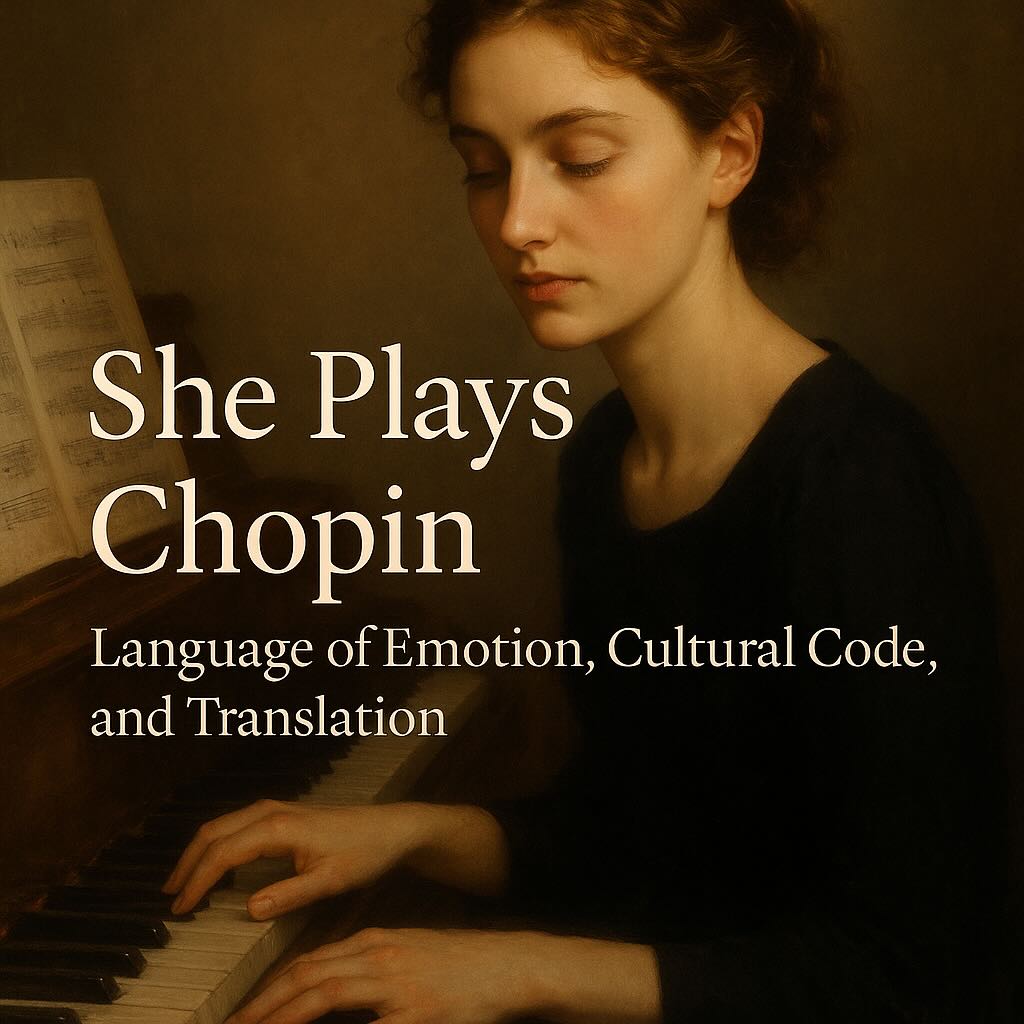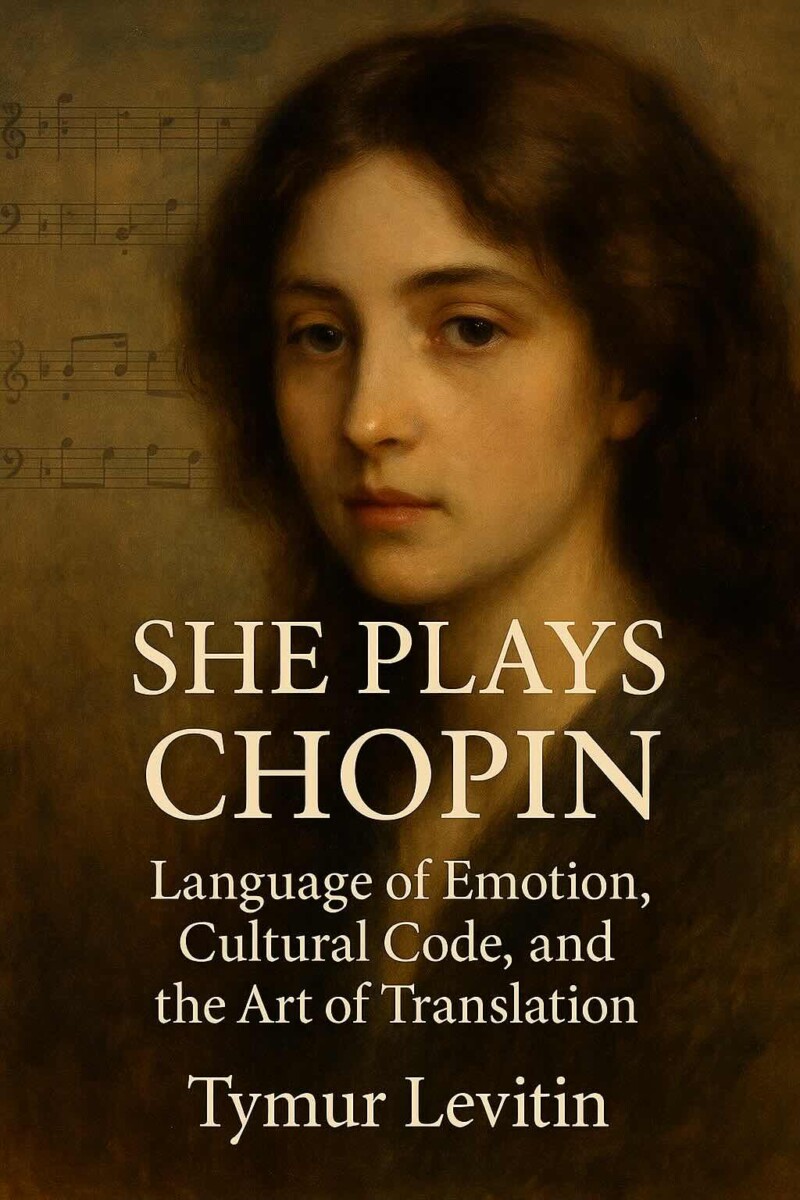Author’s Column | Tymur Levitin on Language, Culture, and Translation
📌 Categories: Author’s Column, Learning English, Learning German, Learning Spanish
🔗 Levitin Language School – Official Website
🔗 Language Learnings – US Website
“She plays Chopin…”
These words from Artur Rudenko’s song are not only about love.
They are about language.
About how one verb, one comparison, creates a portrait of a woman we seem to know — though so little is said about her.
🔸 She Plays Chopin — what we hear
She plays Chopin.
Her delicate fingers flutter.
She couldn’t find happiness —
And began to smile less.
This is not a description. It is life in a few lines.
The verbs of the past (“couldn’t find,” “began”) clash with the verbs of intention (“this woman will be mine,” “I’ll warm her soul”), creating tension between what has already happened and what may still come.
🔸 Comparing with Evgeny Grigoriev (Zheka)
With Evgeny Grigoriev, the refrain “This woman will be mine” takes on another meaning.
The vocals remain Artur Rudenko’s, but the video is made of photographs: himself, his wife, their moments together. Some are in color, others in black-and-white.
This is the language of memory and loss. A look back.
With Rudenko, it is the beginning of a path. The man carefully approaches a woman who is reserved, perhaps older in spirit, but still ready to warm up again. He offers quiet hope.
🔸 Translation: when words mean more than words
| Russisch | Ukrainisch | Englisch | Deutsch | Spanisch |
|---|---|---|---|---|
| Эта женщина будет моей | Ця жінка буде моєю | This woman will be mine | Diese Frau wird mir gehören / wird meine sein | Esta mujer será mía |
| Я душу ей отогрею | Я їй душу зігрію | I’ll warm her soul | Ich werde ihre Seele erwärmen | Calentaré su alma |
| Она играет Шопена | Вона грає Шопена | She plays Chopin | Sie spielt Chopin | Ella toca a Chopin |
Behind these translations lie different shades:
- In Russian — a firm statement.
- In Ukrainian — it can sound like a dream or a decision, depending on intonation.
- In English — too categorical; often softened with “I hope.”
- In German — “wird mir gehören” is possessive, while “für mich gewinnen” is gentler.
- In Spanish — poetic in Latin America, more dramatic in Spain.
🔸 Subtle lines
“Her delicate fingers flutter”
- In Russian, “flutter” evokes butterflies, birds, snowflakes — transferring weightlessness to the fingers.
- Auf Englisch, flutter feels odd; better: dance over the keys.
- Auf Deutsch, flattern is crude; schweben (“float”) works better.
- Auf Spanisch, revolotear recalls insects; volar sobre las teclas (“fly over the keys”) captures the image.
“She will appear in my dream”
- In Russian/Ukrainian — the woman is the subject of the dream: she comes.
- In English — I’ll dream of her again: the man is active.
- In German and Spanish — the same.
👉 Slavic cultures see the dream as a gift. Western cultures see it as memory at work.
🔸 Literature, language, and cultural code
Why does this song resonate?
Because it is written like poetry.
Even without music, it speaks.
Rhyme as footsteps. Intonation as breath.
A language of emotions, not rules.
🔸 Translation as learning and cultural work
This song shows:
- how one verb changes the whole picture;
- how grammar directs emotion;
- how culture turns a word into either confession or authority.
For students and translators this is a unique exercise: to translate not words, but the breath of language.

📌 Other versions:
Русская версия
Українська версія
Deutsch
Español
Also read in the Levitin Language School Blog:
- Realia in der Übersetzung verstehen: Kulturelle Nuancen in verschiedenen Sprachen
- “Girl”, “Baby”, «Детка»: One Word — Two Worlds
- A Woman Has No Age When She Is Beloved: Language, Culture, and Translation
- Why “a apples” Doesn’t Exist: Grammar and Logic of Language
- Stop Memorizing. Start Thinking: Language as Thought
© Tymur Levitin — Founder, Director, and Head Teacher Levitin Language School | Start Language School by Tymur Levitin
Author’s Work | All rights reserved
























